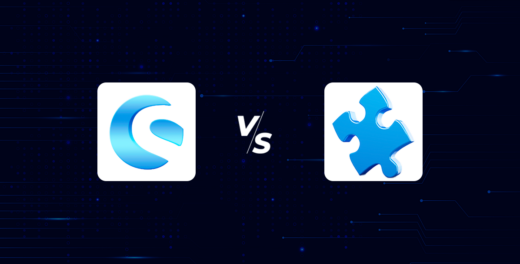Greetings! I'm Aneesh Sreedharan, CEO of 2Hats Logic Solutions. At 2Hats Logic Solutions, we are dedicated to providing technical expertise and resolving your concerns in the world of technology. Our blog page serves as a resource where we share insights and experiences, offering valuable perspectives on your queries.

An online store is incomplete without the right tools to enhance its performance. If you use Shopware as your e-commerce platform, you might wonder whether a Shopware app or a Shopware plugin best fits your business needs. Both offer unique advantages, but understanding their differences is key to making an informed decision.
In this article, we’ll explore the key features, benefits, and considerations of apps and plugins, helping you determine which solution will best enhance your online store’s capabilities and drive your business success.
What is a Shopware App?
A Shopware app is an additional third-party system or software module that improves the functionality of an online store. These apps are designed to integrate with the platform. This allows the store to add additional features and tools to enhance the store’s capabilities. The Shopware app architecture is built to ensure seamless integration and optimal performance.
These applications often come from third-party developers or Shopware plugin development services companies. This means there are several avenues for customizing and optimizing online stores, depending on the specific business goals you have in mind.
Advantages of Shopware Apps
Shopware apps come with a variety of advantages that cater to different aspects of e-commerce operations. Some common features include:
Increase functionality: Apps add new features like advanced product search, personalized product recommendations, or additional payment gateways.
Integrate with different software: They can be integrated with other systems like CRM platforms, ERP software, marketing tools, etc., for the operation of business processes.
Configure according to your needs: Applications mean the configuration of the online storefront appearance, user experience, and functionalities to suit specific branding and operational needs.
Grow your business: They let an e-commerce store grow in terms of added features and functionalities as the business grows without putting in much development effort.
Get support from developers: Due to this fact, the app developers will generally provide continuous support and updates to ensure compatibility with Shopware updates and also fix the possible issues that may pop up.
What is a Shopware Plugin?
A Shopware plugin is a piece of software that extends the functionality of an eCommerce store. It integrates seamlessly with the platform to add new features, customize existing ones, or enhance the overall performance of the online store. These plugins are designed to meet specific business needs and are typically developed by third-party developers.
Advantages of Shopware Plugins
Customization: With the help of plugins, merchants can make changes to their online shops regarding their needs at any time without the need to change the codebase.
Functionality Extension: These features include payment gateways, shipping methods, product sliders, marketing plugins, and search engine optimization tools, among others, hence improving the store’s capabilities.
Integration: They blend well making sure it does not affect other organizational processes heavily.
Scalability: As businesses grow, plugins can scale up to handle more transactions as well as increased traffic and operational complexities.
Support and Updates: For any technical issues that may arise about the plugins, the developers are always available, and the plugins are also revised from time to time to conform to new security standards and versions.
Key Differences Between Shopware Apps and Plugins
How to install and configure them
Plugins: They are normally downloaded from the internet manually, uploaded to the backend, and then activated. In most cases, adjustments to settings are done via the interface.
Apps: For installation, they are available in a user-friendly way through a Shopware store. It is normal for configuration to be done on separate interfaces of the applications or other than the backend.
Performance versus Scalability
Plugins: Since plugins integrate directly with the code, they can potentially impact performance, especially complex plugins. Scalability can be limited if the plugin relies heavily.
Apps: Operate as external applications, minimizing the direct impact on the performance. They often scale independently, as they run on their servers.
Customization against Flexibility
Plugins: They have more options to configure since they change the codes directly. By using this method, several features and functionalities can be developed by the developers.
Apps: Less configurable in general, as they interact with APIs and webhooks. Though in some applications there may be configurations within the interface itself.
Safety Concerns
Plugins: Since plugins are integrated with the code, any vulnerabilities contained within the plugin may put the security of the entire store at risk. Great attention needs to be paid to the origin of plugins and the updating process.
Apps: They run independently on the system; thus, the effect on its security is much more reduced, which touches applications running within the core system. On the contrary, there can be threats connected to the security app itself.
Development and Maintenance
Plugins: This includes the development of a given framework and a programming language. Developing plugins not only requires update cycles but also their maintenance.
Apps: Since interaction is outside, different technologies can be used to develop them. The maintenance could also be independent of the development platform of that app or its update cycle.
Cost and Availability
Plugins: Can be free or paid. More may exist due to the simplicity of development compared to apps, offering many different functionalities.
Apps: The rest are mostly free and paid, available in the store, with a defined structure for pricing. Fewer may exist due to more development and security going into these compared with plugins.
Conclusion
From this, we can conclude that your business demands and objectives will determine which Shopware app or Shopware plugin is best for you. With apps, your organization may be able to grow if you want to expand your company without eradicating essential efficiency. They include internal extensibility, external extensibility, simplicity, and increase in scale. On the other hand, merchants who need particular functionalities and significant changes can use Shopware plugins, which provide added options and integration into Shopware code.
Knowing all the major differences, advantages, and factors will help you make an informed decision that will suit your online store’s needs, enhance eCommerce performance, and translate to company success. You can consult Shopware developers, who offer Shopware development services, to find the right tool for your e-commerce store.

Related Articles





